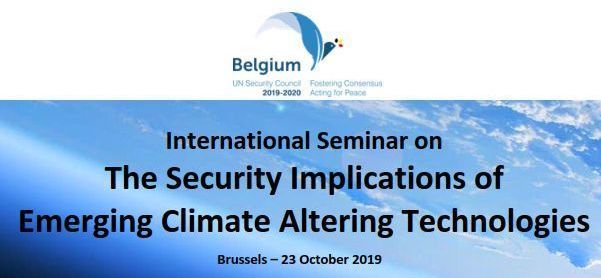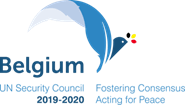The Security Implications of Emerging Climate Altering Technologies

23 October 2019 - Royal Military Academy, Brussels
Addressing the Climate and Security nexus is one of Belgium’s priorities for its 2019-2020 mandate as an elected member of the United Nations Security Council. Climate Change is a threat multiplier that is already having major impacts on international peace and security.
Recently more and more scientific research is aimed at mitigation alternatives through deliberate and large-scale intervention in the Earth's climate system or “geoengineering”, for example through solar radiation modification.
The Belgian Federal Public Service of Foreign Affairs partnered with Environment and Development Resource Center (EDRC) to organize a seminar that took stock of current academic thinking on the security implications of these unprecedented techniques.
In addition, the event addressed the frameworks for governing geoengineering from both a security and climate perspective. The aim is to gather stakeholders from different backgrounds to stimulate an open exchange of ideas, to raise awareness and to contribute to further policy development.
The seminar was held on 23 October 2019 at the Belgian Royal Military Academy in Brussels.
Specific questions addressed included:
- How might geoengineering help mitigate the climate crisis?
- What are the potential security consequences from efforts to use geoengineering for this reason?
- Are there adverse security risks of geoengineering?
- How should the precautionary principle operate to assess the potentially unintended consequences of geoengineering?
- What legal and policy frameworks should be considered for governing geoengineering from both a security and climate perspective?
- PRESS RELEASE
- PROGRAMME
- PRESENTATIONS:
Opening Remarks by Didier Reynders, Deputy Prime Minister and Minister of Foreign and European Affairs and Defence, Kingdom of Belgium
Introduction to the Programme and Objectives by Alexander Verbeek, Policy Director, Environment & Development Resource Centre / Founder, Institute for Planetary Security
The Promise and Perils of Intervention in the Climate System by Oliver Morton, Briefings Editor, The Economist (formerly Energy and Environment Editor) / Former, Chief News and Features Editor, Nature / Author of The Planet Remade: How Geoengineering Could Change the World
Introduction to Geoengineering: Feasibility, Costs and Impacts by Dr Jason Blackstock, Associate Professor, Department of Science, Technology, Engineering and Public Policy (STEaPP), Faculty of Engineering Science, University College of London
The Security Implications of Geoengineering by Major General ANM Muniruzzaman (Ret.), Chairman, Global Military Advisory Council on Climate Change (GMACCC) / President, Bangladesh Institute for Peace and Security Studies (BIPSS)
Applying European and International Law Principles and Practice to Geoengineering Governance by Tsvetelina Filipova, Senior Policy Analyst, Climate and Environmental Governance Programme, Institute for European Environmental Policy
RELATED VIDEO

The seminar was organised by the Belgian Federal Public Service of Foreign Affairs and the Environment & Development Resource Centre (EDRC) in association with the Brussels Dialogue on Climate Diplomacy (BDCD), the Carnegie Climate Governance Initiative (C2G), EGMONT - The Royal Institute for International Relations and the Global Military Advisory Council on Climate Change (GMACCC).
